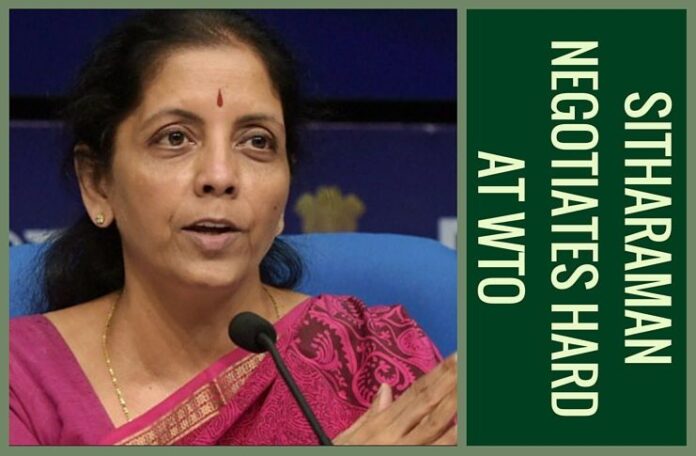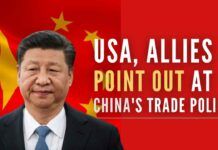
[dropcap color=”#008040″ boxed=”yes” boxed_radius=”8px” class=”” id=””]N[/dropcap]ew Delhi, Dec 22 – India negotiated hard at the WTO’s recent Nairobi ministerial meeting to ensure that the interests of developing countries remain at the centre of the multi-lateral trade body’s agenda, parliament was informed on Tuesday.
“India negotiated hard to ensure that the WTO continues to place the interest of developing countries and LDCs (least developed countries) at the centre of its agenda,” Commerce Minister Nirmala Sitharaman told the Lok Sabha.
Some developed countries, including the US, are opposed to the continuation of the Doha Development Round negotiations launched in 2001, she said in a statement to the House, following her return from Nairobi meeting that concluded on Saturday.
Even as rich nations conceded to the demands of emerging economies on issues such as finding a permanent solution to disputes over government stockpiling of food for security, India protested the non-inclusion of the development agenda at the latest trade talks.
The Nairobi Ministerial Declaration acknowledged that members have different views on how to address the future of the Doha Round, but also noted the strong commitment of all members to advance negotiations on the remaining Doha issues, Sitharaman said.
“India not only made a statement to this effect at the closing ceremony on December 19 but also made a written submission to the Director General, WTO and the Chair of the 10th Ministerial Conference,” the minister said.
She also said on demand from a large number of developing countries for a Special Safeguard Mechanism (SSM) for agricultural products, India negotiated a ministerial declaration that recognises that developing countries will have the right to have recourse to an SSM.
The SSM allows developing countries to resort to higher customs duties on some farm produce to protect the interests of its farmers.
[dropcap color=”#008040″ boxed=”yes” boxed_radius=”8px” class=”” id=””]A[/dropcap]s the future of WTO’s Doha Development Agenda (DDA) appeared in doubt, India succeeded in obtaining a re-affirmative ministerial decision on public stock holding for food security purposes, Sitharaman said.
India’s statement issued at the end of the Nairobi talks said: “Notwithstanding the difficulty in the negotiations, the draft declaration reflects India’s demand for a reaffirmation from all members to work towards a permanent solution on public stock-holding.”
On new issues like investment and e-commerce being pushed by developed countries, Sitharaman said the Nairobi Declaration acknowledges the differences in views and states that any decision to launch negotiations multilaterally would need to be agreed by all members.
The minister said all countries agreed to the elimination of agricultural export subsidies subject to the preservation of special and differential treatment for developing countries such as a longer phase-out period for transportation and marketing export subsidies.
“The reduction in the massive subsidization of the farm sector in developed countries, which was the clear-cut mandate of the DDA, is now not even a subject matter of discussion today, leave aside serious negotiations,” Sitharaman had said at the plenary session at Nairobi.
She told the Lok Sabha on Tuesday that the Nairobi ministerial decision contains disciplines that “include terms to limit the benefits of financing support to agriculture exporters, rules on state enterprises engaging in agricultural trade and disciplines to ensure that food aid does not negatively affect domestic production. Developing countries, such as India, are given longer time to implement these rules.”
(IANS)
- Pentagon cancels aid to Pakistan over record on militants - September 2, 2018
- The curious case of Tamil Nadu’s opposition to NEET - September 4, 2017
- If 2.6 Billion People Go To War: India vs. China - July 22, 2017










